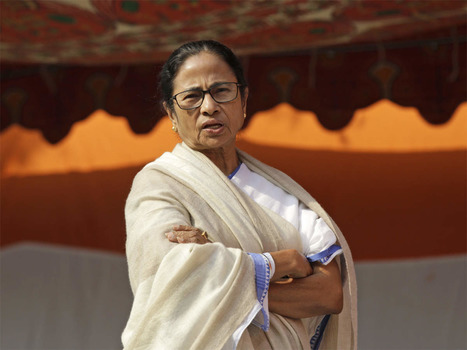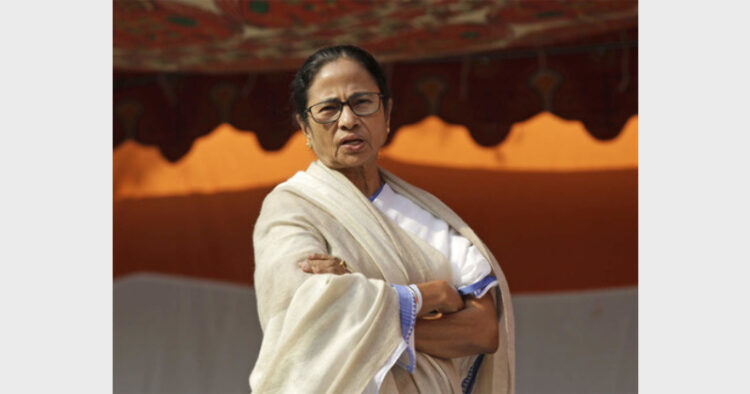New Delhi: The case of the pot calling the kettle black is nothing new in politics. But about the ‘politics of Mamata Banerjee – it is a typical characteristic and a dominating theme.

There are half a dozen nationally known instances wherein West Bengal Chief Minister displayed intolerance. But she – like most of the protagonists in Sickularism backyards – never misses a point to point out lapses and limitations for others.
She had thrown those tantrums at the Marxists for a long, and during UPA days, she even embarrassed Montek Singh Ahluwalia once just because some Left cadres staged a demonstration against her.
The latest instance is – even at the selection of judges as a litigant she has her likes and dislikes.
Mamata’s trusted lieutenant, Derek O’ Brien, on Friday tweeted raising objections to the fact that her petition on the Nandigram election has been referred to a judge named, Justice Kaushik Chanda.
“Who is that person ‘circled’ in both pics? Is the Justice Kaushik Chanda of Calcutta High Court? Has he been assigned to hear the Nandigram election case? Can the judiciary sink any lower?” Trinamool Congress Rajya Sabha floor leader tweeted.
So by this example alone, one understands Trinamool and Mamata’s definition of ‘tolerance’ and ‘freedom’ as a litigant is, she should get a judge of her liking – who will promptly endorse her viewpoint and declare the Nandigram poll outcome void.
Justice Chanda was sharing the stage with BJP leader Dilip Ghosh.
Here too the ‘tolerance’ angle comes in. After all, it was at Nandigram, she lost the election herself to Suvendu Adhikari. Her onetime aide turned into a bitter political detractor.
Those who have followed Mamata’s politics and tracked her party as journalists would share several instances – wherein she had leveled journos as “CPI-M men”. The issue is few of those journalists have beards.
One female TV journalist was more or less permanently leveled by her as “someone from CPI-M channel”.
So, for journalists, she prefers those who will attend her briefings, accept dictations, enjoy hospitality and fish-fry, and, of course, ‘entertain’ everyone by singing Rabindra sangeets now and again.
She has staged walkouts from TV shows many times in the past.
None can ask a question that she does not like, and here was the ‘democratic empress’!
When Mukul Roy joined the Trinamool Congress on June 11 this year, she ended the press conference abruptly when a journalist spoke about Suvendu Adhikari.
She thought it would be wise and her expression of ‘freedom’ to skip the meeting the Prime Minister held to review the cyclone.
Now moving on to some more serious issues and events wherein Mamata’s ‘freedom of speech comes into focus.
In April 2019, the Supreme Court slapped a fine of Rs 20 lakh on the West Bengal government for imposing a “virtual” ban on the public screening of the satirical Bengali film ‘Bhobishyoter Bhoot’ (meaning – Ghosts from Future) in the state.
Here the ‘offense’ was that the film plot revolves around a group of ghosts, including a politician, who assembles at a refugee camp.
“Such attempts (when a film is pulled out unceremoniously) are insidious and pose a grave danger to personal liberty and free speech and expression,” the apex court had ruled.
She showed unusual and rapid ‘intolerance’ to the slogan ‘Jai Shri Ram’, on January 23, 2021.
She even threatened a group of youngsters when they raised the slogan ‘Jai Shri Ram’.
In December 2020, BJP chief J P Nadda waxed eloquently and had said – “For West Bengal Chief Minister Mamata Banerjee…. thy name is intolerance”.
Nadda and other BJP leaders did not miss the point that Mamata’s ‘tolerance-free speech’ debates and episodes are orchestrated well to suit her Muslim appeasement politics.
“When the entire country was watching the ‘Bhoomi Pujan’ (of Ram temple in Ayodhya), Mamata Banerjee imposed a lockdown in West Bengal on August 5, 2020, to prevent people from being part of the occasion at the local level,” Nadda pointed out.
In sharp contrast, he said, “… the lockdown was withdrawn for Bakr-Eid, on July 31.”
In 2012, four alleged Trinamool workers had assaulted a Jadavpur University professor, Ambikesh Mohapatra, for posting a meme/cartoon on the internet showing Mamata Banerjee.
An old-timer in her party had hesitatingly said a few years back, “Mamata’s tolerance and intolerance and freedom of speech, etc is guided by a mix of philosophies of two other political parties, the CPI-M and the Congress.”
Not surprisingly, the CPI-M stalwarts including the likes of Jyoti Basu had seldom shown a liking for questions – not to talk about criticism on the face. Basu was said to have asked scribes asking uncomfortable questions several times, “Which paper? Are you from Ananda Bazar?”
Sonia Gandhi held most of her press conferences outside of New Delhi during her time as UPA chairperson or Congress president. In the capital, ‘handpicked journos from handpicked media’ were given the honor of questioning her.
These journalists attended luncheon meetings hosted by Sonia, and there have been occasions she would make a round of the tables and exchange pleasantries. But shortly before, the media team would advise the scribes not to ask questions.
I distinctly remember, one day a senior journalist asked her, “Madam, when can we have a formal press conference to ask you questions.”
Loyalty journalism truly flourished under different political parties in Delhi and also in several states. But things would not be so blunt as with few leaders such as Mamata Banerjee.
This scribe once asked Mamata whether she would meet PM Manmohan Singh – her response would be, “You cannot decide my program”.
But it is an irony of Indian politics and political journalism that such leaders unhesitatingly speak out against Narendra Modi. And they virtually get away with anything.
But one who had covered Gujarat mayhem of 2002 in Ahmedabad for months can vouch that even during the peak of law and order issues, journalists – including from outside Gujarat – had a gala time in terms of ‘democracy and full freedom’ while reporting the riots.
In contrast, the media personnel covering Singur and Nandigram agitations during the Left regime also faced hurdles.
Similarly, the post-election violence in West Bengal, which targeted BJP employees and supporters, has received little coverage in the Kolkata media, which includes both regional English and Hindi newspapers.
Even the state Governor Jagdeep Dhankhar made a brief comment on the so-called absence of the media.
“Nothing can be more shameful for us than the people of West Bengal taking shelter in other states… Even the media did nothing. It is an open secret who the perpetrators were,” he had said.
West Bengal BJP president Dilip Ghosh said it is ‘high time’ the fourth estate discharges its duties and shows how sorry and a gory state of affairs it has turned out to be.
The scale of post-election violence has been unprecedented, but the Mamata government has attempted to make light of the situation, including politicizing the Governor’s travel plans.
Hundreds of BJP supporters and workers are still in Assam camps, and a few have died in intense violence.














Comments